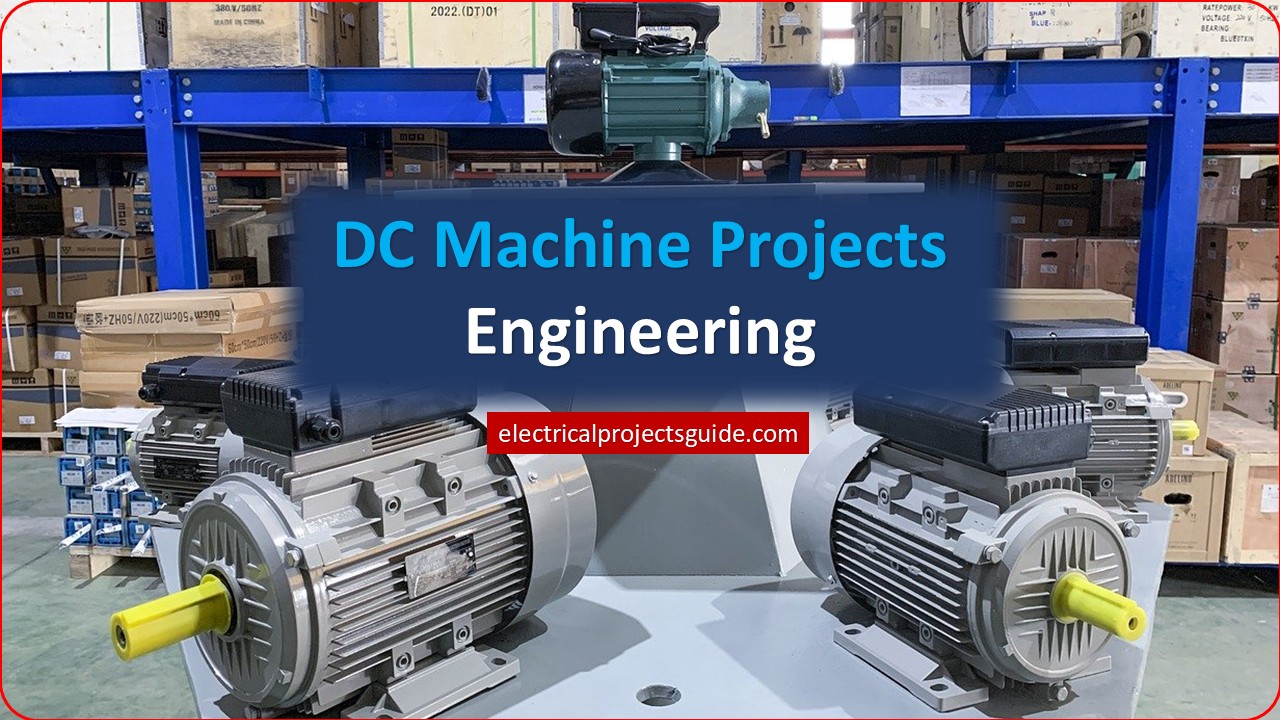DC machines are those electrical machines that work using direct current. They have applications in areas such as electronics equipment that are powered by battery, industries where specific motor characteristics are necessary, electric vehicles, etc.
It would be good to do an academic project in the field of DC machines. The projects about DC motor and the practical applications enhances your electrical engineering subject knowledge.
Here we are explaining some of DC machine related projects for engineering students.
DC MACHINE PROJECTS FOR ENGINEERING STUDENTS
#1 FOUR QUADRANT CONTROL OF DC MACHINE
Four-quadrant control of a DC machine refers to the capability to operate the machine in all four quadrants of the speed-torque plane. Essentially, it allows for both motoring and braking in forward and reverse directions. Here’s a brief overview of the four quadrants:
- First Quadrant (Forward Motoring):
- The machine operates as a motor.
- Speed and torque are positive.
- The machine drives the load in the forward direction.
- Second Quadrant (Forward Braking):
- The machine operates as a generator.
- Speed is positive, but torque is negative.
- The machine absorbs energy from the load, braking in the forward direction.
- Third Quadrant (Reverse Motoring):
- The machine operates as a motor.
- Speed and torque are negative.
- The machine drives the load in the reverse direction.
- Fourth Quadrant (Reverse Braking):
- The machine operates as a generator.
- Speed is negative, but torque is positive.
- The machine absorbs energy from the load, braking in the reverse direction.
As part of the academic project, a four-quadrant controller for DC machines shall be developed. Usually, it would be helpful for the applications such as electric vehicles, etc.
#2 DC MACHINE SOFT STARTER
A soft starter helps a DC motor start smoothly by gradually increasing the voltage, instead of giving it full power all at once. This reduces the sudden rush of electricity (inrush current) and mechanical stress on the motor. As a result, the motor starts up gently, lasts longer, and the whole system works more reliably.
The starter circuit is a power electronics project that you could try for yout mini project or main project.
Since the concept is old, we have to think what new could be added to the project.
#3 DC MACHINES FOR ELECTRIC SCOOTER
Electric vehicles these days use different types of motors for its operation Controller for DC machine for EV applications shall be developed. The performance of the motor for different loading conditions can be analyzed in this project.
Electric vehicles follow various drive cycles and the motor performance such as power, energy, efficiency, temperature, etc. plays a critical role in the effective operation of the vehicle.
More electric vehicle related projects shall be available here: List of 50 electric vehicle projects for Engineering Students – Get Electric Vehicle
#4 DYNAMIC BRAKING SYSTEM FOR DC MOTORS
Implement a dynamic braking system for a DC motor and evaluate its effectiveness. You shall make a proposal to develop an effective regenerative braking system for electric vehicles that use DC machines.
#5 TORQUE CONTROL FOR DC MOTOR
Develop a control system that can adjust the torque of a DC motor in real-time. This can be used in various applications such as EV conveyor belt, etc.
#6 ROBOTIC ARM USING DC MACHINES
Build a robotic arm powered by DC motors and program it to perform specific tasks such as product development, packing etc.
#7 AUTOMATED CONVEYOR BELT USING DC MACHINES
Design an automated conveyor belt system using DC motors for material handling at airports, industries, etc.
#8 MOBILE ROBOT USING DC MOTORS
Develop a mobile robot with DC motors for navigation and obstacle avoidance. The control system for the robot shall be developed with detailed requirement and technical analysis.
#9 DC Motor Testing Setup
DC motor testing setup with meters, current injection facility, voltage and current control set up, torque control and measurement system can be a simple yet good project. Build a testing setup to measure the performance characteristics of different DC motors. This set up can be commercially for laboratories, engineering colleges, and other educational institutions.
More accurately developed systems shall be used for the performance testing of DC machines for different applications.
CONCLUSION
We have seen a few DC motor related electrical engineering projects ideas here. They can be developed as some interesting academic projects.
